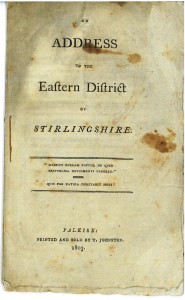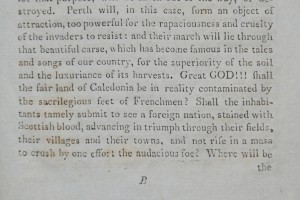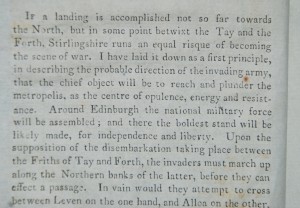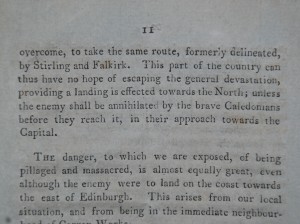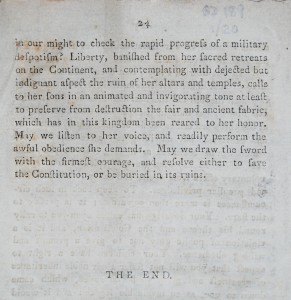‘Great GOD!!! Shall the fair land of Caledonia be in reality contaminated by the sacrilegious feet of Frenchman?”
Within the Stirling Council Archives Murray of Polmaise collection, there is a rare pamphlet concerning the threat of an invasion of Scotland by Napoleon Bonaparte. Printed in 1803 by T. Johnston of Falkirk, the pamphlet is a propaganda piece titled ‘An Address to the Eastern District of Stirlingshire’. The author is certain that if an invasion takes place on Scottish shores, Stirlingshire will be ‘visited and depopulated by the invading army’.
The title page addresses, in Latin, the tone and mood of the pamphlet. It reads:
“darent operam populi, ne quid respublica detrimenti caperet.
Quis pro patria dubitabit mori?”
Translated:
“Should take care of the people, to prevent any harm to the republic,
Who will hesitate to die for their country?”
The threat of an invasion by Napoleon on British shores was a strong possibility at the time of the publication. In 1796, there was “Expédition d’Irlande”. This was an unsuccessful attempt by the First French Republic to aid the Society of United Irishmen in a planned uprising against the British. The two countries had also been at war during the French Revolutionary Wars. The Treaty of Amiens was signed in 1802 to declare peace between the nations but would breakdown in 1803, the year the pamphlet was printed.
The pamphlet was anonymously written but the author hailed from Falkirk. It begins by stating the author is “one of yourselves, who is desirous of impressing you with a deep sense of the public danger’. That danger was invasion. The writer also addresses why he has opted for innominate. He states that ‘he has only assumed the liberty to warn and instruct, THAT THEY MIGHT BE FREE’.
The pamphlet is noteworthy for the way it hypothesises the various ways Napoleon could invade Scotland. If Napoleon invaded in the North-East of Scotland, this area would become a theatre of war. With the motivation of the French soldiers ‘only driven by plunder and spoil’, the French would make their way to the cities of Scotland. Provisions would be taken from the villages between Aberdeen and Dundee, and Perth would ‘form an object of attraction, too powerful for the rapaciousness and cruelty of the invaders to resist’.
Falkirk and Stirlingshire ran a great risk being a theatre of war if the French landed between the Tay and the Forth. The Carron-Works, a shot and artillery depot, would be a key target for the French. They would also ‘infallibly mark their way with pillage, desolation and death!’
The pamphlet closes with rousing statements to uplift the reader. The author writes ‘Let the spirit of the country be awakened, let its resources be called into energy’ let the whole population be trained to military discipline; and then we shall present to the invaders a front, as impenetrable as the Macedonian phalanx”.
He finishes by stating ‘May we draw the sword with firmest courage, and resolve either to save the Constitution, or be buried in its ruins’.
